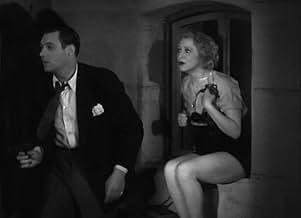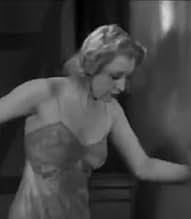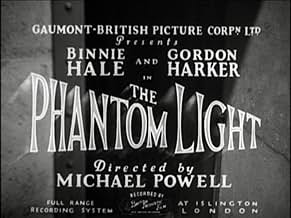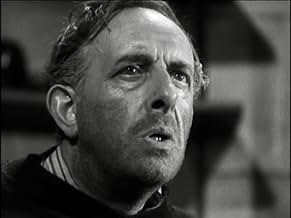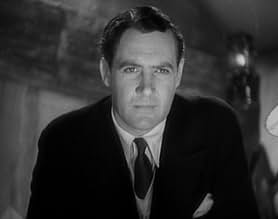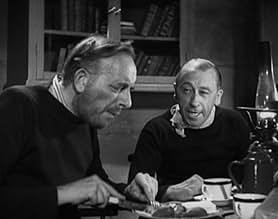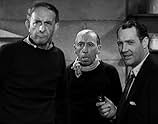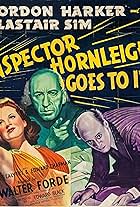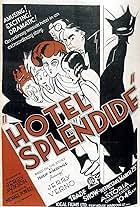A lighthouse keeper has been murdered in mysterious circumstances and, during the ensuing investigation a Phantom Light keeps appearing at the scene of his death.A lighthouse keeper has been murdered in mysterious circumstances and, during the ensuing investigation a Phantom Light keeps appearing at the scene of his death.A lighthouse keeper has been murdered in mysterious circumstances and, during the ensuing investigation a Phantom Light keeps appearing at the scene of his death.
Anthony Holles
- Mr. Mason
- (uncredited)
Ernest Jay
- Railway Worker
- (uncredited)
Vi Kaley
- Woman in Pub
- (uncredited)
John Singer
- Cabin Boy
- (uncredited)
Featured reviews
The Phantom Light is directed by Michael Powell and adapted from the Joan Roy Byford and Evadne Price play The Haunted Light. It stars Gordon Harker, Binnie Hale, Donald Calthrop, Milton Rosmer, Ian Hunter and Herbert Lomas. Cinematography is by Roy Kellino and music by Louis Levy.
Harker stars as lighthouse keeper Sam Higgins, who gets more than he bargained for when he takes up employment at the North Stack Lighthouse out on the foggy Welsh coast.
Some time before he formed half of the classic film making partnership with Emeric Pressburger, Michael Powell was a 1930s purveyor of the "quota-quickie" British movie. Not many of those films remain in print, thankfully this delightful blend of comedy and suspense is now in home format circulation. Out of Gainsborough Pictures, The Phantom Light harks back to a wonderful time of sincerity in film making, the acting mannerisms are as correct as the dialect (it's so nice to hear the term Michaelmas used), the locale is beautifully realised and maximum dramatic impact is garnered from the minimalist settings (three parts of the film is set in the lighthouse itself). Powell proves to be adept at eking out eerie atmospherics from the story, aided superbly by Roy Kellino's photography, while it's no small triumph to actually blend the comedy with the drama and not hurt the flow of the film.
Tan-y-Bwlch and lummee, what a night!
It's not perfect by any stretch of the imagination, Hale is annoyingly high pitched and shoe-horned into the fray, though her beautiful legs go up to her armpits and distract the red blooded amongst us, and the actual turn into the suspense realm comes, considering the running time, a bit too late in the story. But the faults are actually minor ones and they don't ultimately affect the enjoyment on offer for the classic film fan. It very much can be seen as a precursor and influence to the great Will Hay pictures, Ask A Policeman & Oh! Mr. Porter, and if you want links away from the thematics and plotting? Which are joyously similar, then Herbert Lomas was in Ask A Policeman and Louis Levy scored both. It doesn't have the slapstick that dominated the Hay movies, here the wit is dry and neatly pitched as polar opposites are thrust together under one lighted roof, but this is more a light hearted thriller than a comedy drama. With excellent locations used (Devon/Wales), and a director taking his early tentative steps to greatness (yes you read right), it's a film that has enough reasons to check it out regardless of story. As it is, it's pretty darn good anyway. And I'll be back to say the same thing after my next viewing at Michaelmas. 7.5/10
Harker stars as lighthouse keeper Sam Higgins, who gets more than he bargained for when he takes up employment at the North Stack Lighthouse out on the foggy Welsh coast.
Some time before he formed half of the classic film making partnership with Emeric Pressburger, Michael Powell was a 1930s purveyor of the "quota-quickie" British movie. Not many of those films remain in print, thankfully this delightful blend of comedy and suspense is now in home format circulation. Out of Gainsborough Pictures, The Phantom Light harks back to a wonderful time of sincerity in film making, the acting mannerisms are as correct as the dialect (it's so nice to hear the term Michaelmas used), the locale is beautifully realised and maximum dramatic impact is garnered from the minimalist settings (three parts of the film is set in the lighthouse itself). Powell proves to be adept at eking out eerie atmospherics from the story, aided superbly by Roy Kellino's photography, while it's no small triumph to actually blend the comedy with the drama and not hurt the flow of the film.
Tan-y-Bwlch and lummee, what a night!
It's not perfect by any stretch of the imagination, Hale is annoyingly high pitched and shoe-horned into the fray, though her beautiful legs go up to her armpits and distract the red blooded amongst us, and the actual turn into the suspense realm comes, considering the running time, a bit too late in the story. But the faults are actually minor ones and they don't ultimately affect the enjoyment on offer for the classic film fan. It very much can be seen as a precursor and influence to the great Will Hay pictures, Ask A Policeman & Oh! Mr. Porter, and if you want links away from the thematics and plotting? Which are joyously similar, then Herbert Lomas was in Ask A Policeman and Louis Levy scored both. It doesn't have the slapstick that dominated the Hay movies, here the wit is dry and neatly pitched as polar opposites are thrust together under one lighted roof, but this is more a light hearted thriller than a comedy drama. With excellent locations used (Devon/Wales), and a director taking his early tentative steps to greatness (yes you read right), it's a film that has enough reasons to check it out regardless of story. As it is, it's pretty darn good anyway. And I'll be back to say the same thing after my next viewing at Michaelmas. 7.5/10
First off there is a very nice DVD of this mixed with some other British Thrillers. Looks and sounds good. That's great because the movie isn't too gripping and would dissolve with any distractions. The movie is an odd mix of "silent" movie acting and a long set up that takes up way too much time. The welsh village is fun and interesting--there are other later British films that have this same kind of small village opener with a stranger appearing and a mystery being resolved. It's a formula that works more often than not. But the movie fails to really evoke much spookiness of the lighthouse itself. It's never interested in generating any suspense for very long. Usually there is some very brief suspense moment, and it's just to set up more comedy. The comedy is fairly funny but no real sense of danger is generated. No sense of the story moving forward. There are also touches from (then trend setting) Russian montage editing that seem kind of comical in an unintended way. As you'd expect from director Powell there are a few nice camera moves and some good location photography. A music score would have helped this film there is none at all, perhaps a cost saving element? Or just a wrong choice? There are things to enjoy here but you have to get over the 30's cliché elements of "flapper girl" and "spunky-male-reporter" and these are pretty creaky indeed. A movie that, perhaps in a very director Michael Powell way, flirts around with various quirky and occasionally unexpected ideas but doesn't commit to any of them enough to become a whole anything. Other reviews of it being an OK time killer are valid.
Michael Powell has completely grown past the early, awkward stages of the sound era and can now use sound to create interesting soundscapes in service to atmosphere. This is easily his most atmospheric film to date which is unfortunately tied to a script that just doesn't quite work. There are too many outside views of the remote community centered around the coastal lighthouse and not enough from the inside, making it a mystery to such a level that it's hard to grasp what the mystery is even about. Still, that atmosphere really does help things.
Sam Higgins (Gordon Harker) arrives at Tan-Y-Bwlch in Wales to take up his position as chief lighthouse keeper after the mysterious death of its previous occupant of the role, Jack Davis. Really, he just disappeared. At the train station, he meets Binnie (Alice Bright) from out of town who's waiting for a car into town. In town, he also meets a man who lets himself be known as a journalist, Jim (Ian Hunter), who tries to bribe his way onto the lighthouse island, a bribe that Sam easily swats away. He's a twenty-five year man, you see. At the lighthouse, he meets his main helper, Claff Owen (Herbert Lomas), a local with many eerie tales of the eponymous light that shines out some nights and leads ships to their death on the rocks.
So, my problem with this is ultimately that Sam isn't there to investigate anything but Binnie and Jim are, but under false pretenses. Sam is mostly just trying to get through his first night, and he's never flustered. He's too experienced for anything else. The one fact that should fluster him, the presence of a half-mad former helper, Tom (Reginald Tate), that Sam ends up tying up to control. Sam isn't interested in the mystery. Instead, Binnie and Tom end up on the island when Tom takes a boat and demands help in the night, a boat on which Binnie had stowed-away. They both have secret interests for investigating the circumstance of Jack Davis' disappearance, but they keep them from each other, from Sam, and from the audience until pretty much the film's ending.
So, we have our main character who's essentially just managing the mess, two supporting characters who are searching for truth but we don't understand any of it, and Claff in the middle talking about the phantom light while Tom tries to escape from his bonds. It's a weird muddle where I was unsure of what was even going on, the whole thing really only held up by that atmosphere. That atmosphere is helped by this constant whirl of wind, the crashing of waves, and the wonderfully naturalistic photography that Powell uses to help set the scene, especially as Sam is approaching the lighthouse. The set on which most of the film takes place is claustrophobic but brightly lit so that we can see everything (it could have used a bit more moodiness in the lighting inside).
And then everything gets revealed. It's a money scheme that's never quite clear but involves the wrecking of ships, a naval officers brother, and the death of Jack. Even how far the conspiracy goes ends up unclear, but the action itself around the resolution is clear enough to function.
If I were given this script, I'd rewrite at least one of those three outsider roles to be from the village, most likely Binnie. Her secret identity ends up not really mattering in the long run, and the lack of any real connection to the village makes everything about it extremely opaque for far too long. Instead, make Binnie Jack's brother or daughter, or something. She knows everyone, but she can't get onto the island for whatever reason. She ends up being able to provide Sam with background and even a reason for him to be invested (he falls for her, maybe). Then we can touch on, perhaps, a conspiracy in the town that she has some sense of but no real specific knowledge of, and someone like Claff or even Tom or Jim could help fill out the details.
So, the mystery is far too opaque for far too long, but the atmosphere really does help, especially since the focus is a bit more sensational in the experience rather than about the details of the mystery. It really would have helped the film overall to have greater clarity around its central narrative. So, it's a mix, not quite successful, but pretty consistently interesting.
Sam Higgins (Gordon Harker) arrives at Tan-Y-Bwlch in Wales to take up his position as chief lighthouse keeper after the mysterious death of its previous occupant of the role, Jack Davis. Really, he just disappeared. At the train station, he meets Binnie (Alice Bright) from out of town who's waiting for a car into town. In town, he also meets a man who lets himself be known as a journalist, Jim (Ian Hunter), who tries to bribe his way onto the lighthouse island, a bribe that Sam easily swats away. He's a twenty-five year man, you see. At the lighthouse, he meets his main helper, Claff Owen (Herbert Lomas), a local with many eerie tales of the eponymous light that shines out some nights and leads ships to their death on the rocks.
So, my problem with this is ultimately that Sam isn't there to investigate anything but Binnie and Jim are, but under false pretenses. Sam is mostly just trying to get through his first night, and he's never flustered. He's too experienced for anything else. The one fact that should fluster him, the presence of a half-mad former helper, Tom (Reginald Tate), that Sam ends up tying up to control. Sam isn't interested in the mystery. Instead, Binnie and Tom end up on the island when Tom takes a boat and demands help in the night, a boat on which Binnie had stowed-away. They both have secret interests for investigating the circumstance of Jack Davis' disappearance, but they keep them from each other, from Sam, and from the audience until pretty much the film's ending.
So, we have our main character who's essentially just managing the mess, two supporting characters who are searching for truth but we don't understand any of it, and Claff in the middle talking about the phantom light while Tom tries to escape from his bonds. It's a weird muddle where I was unsure of what was even going on, the whole thing really only held up by that atmosphere. That atmosphere is helped by this constant whirl of wind, the crashing of waves, and the wonderfully naturalistic photography that Powell uses to help set the scene, especially as Sam is approaching the lighthouse. The set on which most of the film takes place is claustrophobic but brightly lit so that we can see everything (it could have used a bit more moodiness in the lighting inside).
And then everything gets revealed. It's a money scheme that's never quite clear but involves the wrecking of ships, a naval officers brother, and the death of Jack. Even how far the conspiracy goes ends up unclear, but the action itself around the resolution is clear enough to function.
If I were given this script, I'd rewrite at least one of those three outsider roles to be from the village, most likely Binnie. Her secret identity ends up not really mattering in the long run, and the lack of any real connection to the village makes everything about it extremely opaque for far too long. Instead, make Binnie Jack's brother or daughter, or something. She knows everyone, but she can't get onto the island for whatever reason. She ends up being able to provide Sam with background and even a reason for him to be invested (he falls for her, maybe). Then we can touch on, perhaps, a conspiracy in the town that she has some sense of but no real specific knowledge of, and someone like Claff or even Tom or Jim could help fill out the details.
So, the mystery is far too opaque for far too long, but the atmosphere really does help, especially since the focus is a bit more sensational in the experience rather than about the details of the mystery. It really would have helped the film overall to have greater clarity around its central narrative. So, it's a mix, not quite successful, but pretty consistently interesting.
With its wafer thin plot, this relies on the likeability of its cast and it's got just enough of that to make this entertaining from beginning to end. Gainsborough reused the story six years later as BACK ROOM BOY with Arthur Askey and although this won't be in anyone's top ten, it least it doesn't have Arthur Askey in it!
As naff as this is, I think I enjoyed it. I might even watch it again sometime. Why - because it was fun without being a comedy, exciting without being a thriller and watchable without being particularly well made. It relies on its two leads: Binnie Hale and professional cockney Gordon Harker. He's your typical grumpy but loveable cor blimey gov'nr cockney and he really carries this single handedly. He's also got some lovely old forgotten East End expressions. Surely it's time to resurrect this one: "I'll lay a pound to a sausage." It must mean something?
Just as I'm convinced that Genevieve Tobin is Joan Blondell's sister, Binnie Hale obviously must also be another sibling. She was an established actress on the stage but she hadn't quite mastered movie acting, nevertheless she's still better than a lot of established stars over in California. Looking at her, it's hard to believe she's actually the sister of Jessie Matthew's other half - whom, if you're familiar with Sonnie Hale - let's just say he didn't have the classic movie star looks! She's actually rather lovely (which you'd expect if she's Joan Blondell's long lost English sister!)
Some actresses have a magnetic screen presence because of their talent, Miss Hale might not exhibit a lot of talent but she certainly exhibits a lot of her legs - very nice legs too! Since Joseph Breen and his cohorts over in America had by 1935 banned anything remotely saucy, it fell on the shoulders of the British film industry to provide the public with a little bit of sexiness and Binnie Hale in shorts and negligee - not just a negligee but a wet negligee, certainly ticks that box.
Gainsborough in the early thirties didn't really do quality, they just made the sort of stuff you could veg out to with your brain switched off after a hard day's work. They were owned by Gaumont-British so had the same sort of relationship First National did to Warner Brothers. They made cheap simple, basic entertainment for the masses. So if you're not expecting too much from this, I'll lay a pound to a sausage that you might just enjoy it.
As naff as this is, I think I enjoyed it. I might even watch it again sometime. Why - because it was fun without being a comedy, exciting without being a thriller and watchable without being particularly well made. It relies on its two leads: Binnie Hale and professional cockney Gordon Harker. He's your typical grumpy but loveable cor blimey gov'nr cockney and he really carries this single handedly. He's also got some lovely old forgotten East End expressions. Surely it's time to resurrect this one: "I'll lay a pound to a sausage." It must mean something?
Just as I'm convinced that Genevieve Tobin is Joan Blondell's sister, Binnie Hale obviously must also be another sibling. She was an established actress on the stage but she hadn't quite mastered movie acting, nevertheless she's still better than a lot of established stars over in California. Looking at her, it's hard to believe she's actually the sister of Jessie Matthew's other half - whom, if you're familiar with Sonnie Hale - let's just say he didn't have the classic movie star looks! She's actually rather lovely (which you'd expect if she's Joan Blondell's long lost English sister!)
Some actresses have a magnetic screen presence because of their talent, Miss Hale might not exhibit a lot of talent but she certainly exhibits a lot of her legs - very nice legs too! Since Joseph Breen and his cohorts over in America had by 1935 banned anything remotely saucy, it fell on the shoulders of the British film industry to provide the public with a little bit of sexiness and Binnie Hale in shorts and negligee - not just a negligee but a wet negligee, certainly ticks that box.
Gainsborough in the early thirties didn't really do quality, they just made the sort of stuff you could veg out to with your brain switched off after a hard day's work. They were owned by Gaumont-British so had the same sort of relationship First National did to Warner Brothers. They made cheap simple, basic entertainment for the masses. So if you're not expecting too much from this, I'll lay a pound to a sausage that you might just enjoy it.
I didn't expect much from this obscure film and that was the right approach.
The film's pace is a big letdown - it's consistently slow from beginning to end. The scriptwriters couldn't have been bothered with the development of the story, as it is never made clear what is going on.
Gordon Harker does quite well and tries his best to enliven the proceedings but it's all in vain.
Did you know
- TriviaWhen Alice Bright (Binnie Hale) remarks that she had just been performing in a play, Sam Higgins (Gordon Harker) retorts, "East Lynne?" This is a reference to the oft produced play and movie of Mrs. Henry Wood's novel of the same name. "East Lynne" was enjoyed for its mad plot and frequently incomprehensible dialogue.
- GoofsSam Higgins arrives at Tan y Bwlch to take a boat to the North Stack lighthouse offshore. Both places exist but are about 60 miles apart. Tan y Bwlch is on the shore of a reservoir, not the sea, and North Stack lighthouse, on the isle of Anglesey, is onshore, not off.
- Quotes
Alice Bright: Mr Higgins. I'm going to tell you the truth. I'm an actress, hiding from the police.
Sam Higgins: What, you act as bad as all that?
- ConnectionsFeatured in Made in England: The Films of Powell and Pressburger (2024)
Details
- Runtime1 hour 16 minutes
- Color
- Aspect ratio
- 1.37 : 1
Contribute to this page
Suggest an edit or add missing content


